-
 Bitcoin
Bitcoin $84,060.7791
-1.60% -
 Ethereum
Ethereum $1,584.0168
-2.82% -
 Tether USDt
Tether USDt $1.0000
0.00% -
 XRP
XRP $2.0861
-3.10% -
 BNB
BNB $578.8559
-1.57% -
 Solana
Solana $125.9396
-4.72% -
 USDC
USDC $1.0000
-0.01% -
 TRON
TRON $0.2539
2.65% -
 Dogecoin
Dogecoin $0.1532
-3.60% -
 Cardano
Cardano $0.6064
-4.76% -
 UNUS SED LEO
UNUS SED LEO $9.3924
-0.40% -
 Chainlink
Chainlink $12.1573
-3.47% -
 Avalanche
Avalanche $18.8825
-5.11% -
 Stellar
Stellar $0.2350
-2.46% -
 Toncoin
Toncoin $2.8620
-3.98% -
 Shiba Inu
Shiba Inu $0.0...01166
-2.35% -
 Sui
Sui $2.0863
-4.80% -
 Hedera
Hedera $0.1578
-4.35% -
 Bitcoin Cash
Bitcoin Cash $320.6979
-3.08% -
 Litecoin
Litecoin $75.0727
-2.75% -
 Polkadot
Polkadot $3.5242
-3.66% -
 Dai
Dai $1.0001
0.01% -
 Bitget Token
Bitget Token $4.3414
0.04% -
 Hyperliquid
Hyperliquid $15.2530
-4.56% -
 Ethena USDe
Ethena USDe $0.9992
0.01% -
 Pi
Pi $0.6141
-11.07% -
 Monero
Monero $219.9781
2.94% -
 Uniswap
Uniswap $5.1618
-3.81% -
 OKB
OKB $52.2768
-0.17% -
 Pepe
Pepe $0.0...07110
-2.72%
Is there a limit on the transaction amount for Bitcoin spot trading
Bitcoin spot trading limits vary by exchange, influenced by verification levels, liquidity, and network fees; always check specific limits before large transactions.
Apr 08, 2025 at 08:56 am
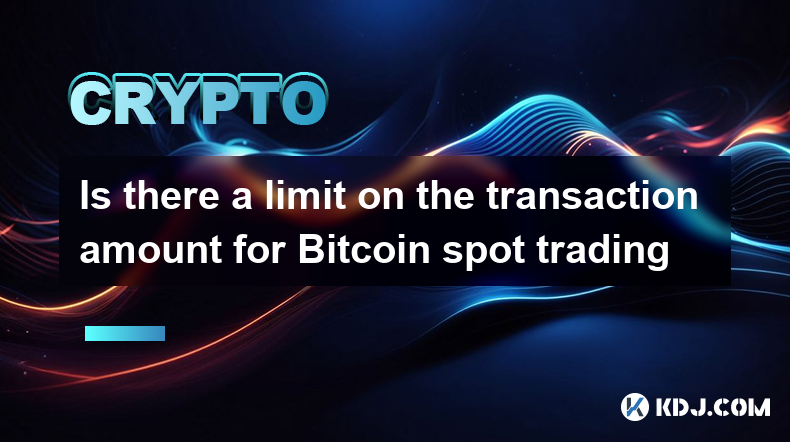
?
Bitcoin's decentralized nature and the absence of a central authority governing transactions mean there isn't a universally imposed limit on the transaction amount for spot trading. However, several factors can effectively limit the size of a single transaction. Understanding these limitations is crucial for high-volume traders.
Exchange-Specific Limits
Each cryptocurrency exchange sets its own limits on the maximum amount of Bitcoin that can be traded in a single spot transaction. These limits vary significantly depending on factors such as the exchange's risk management policies, liquidity, and regulatory compliance requirements. Some exchanges may have relatively low limits for new or unverified users, increasing them as the user's trading history and account verification level improve. Always check the specific limits outlined on your chosen exchange's website before attempting a large transaction.
- Verification Levels: Many exchanges implement a tiered verification system. Higher verification levels, often requiring identity verification and proof of address, unlock higher transaction limits.
- Trading Fees: While not directly a limit on the amount, extremely large transactions can incur substantial trading fees, making them less economically viable. These fees are typically calculated as a percentage of the transaction value.
- Liquidity: Even if an exchange doesn't have an explicit limit, the available liquidity for Bitcoin might restrict the size of a trade you can execute without significantly impacting the price. Large buy orders, for instance, can push the price up considerably if there aren't enough sellers willing to meet the demand at the current price.
Network Fees (Transaction Fees)
Bitcoin transactions are subject to network fees, also known as transaction fees or miner fees. These fees are paid to miners to incentivize them to include your transaction in a block on the Bitcoin blockchain. The size of the fee is directly related to the transaction's size and the network congestion. Larger transactions generally require higher fees to ensure timely processing. During periods of high network congestion, even relatively small transactions can incur high fees.
- Transaction Size: The amount of data included in a Bitcoin transaction affects its size and thus the fee. Larger transactions, involving more inputs and outputs, tend to be more expensive to process.
- Network Congestion: When the Bitcoin network is busy, miners prioritize transactions with higher fees. This means that during periods of high activity, you may need to pay significantly higher fees to ensure your transaction is processed quickly.
- Fee Estimation Tools: Most Bitcoin wallets and exchanges provide fee estimation tools that help you determine the appropriate fee based on the desired transaction speed. It's crucial to use these tools to avoid delays or transaction failures due to insufficient fees.
On-Chain vs. Off-Chain Transactions
The method of transaction also influences potential limitations. On-chain transactions are recorded directly on the Bitcoin blockchain. Off-chain solutions, such as the Lightning Network, allow for faster and cheaper transactions, potentially bypassing some of the limitations associated with on-chain transactions. However, off-chain solutions require setting up channels and might not be suitable for all trading scenarios.
Counterparty Limits
The counterparty involved in the trade might have their own internal limits. If you're trading with a specific individual or entity, they may have restrictions on the amount they're willing to buy or sell at any given time. This is particularly relevant in peer-to-peer (P2P) trading.
Regulatory Considerations
Regulatory frameworks in different jurisdictions can indirectly influence transaction limits. Anti-money laundering (AML) and know-your-customer (KYC) regulations may require exchanges to monitor and report large transactions, potentially leading to stricter limits or delays for very large trades.
Practical Implications
Understanding these factors is crucial for large-scale Bitcoin spot trading. Traders should carefully consider exchange limits, network fees, and potential counterparty limitations when planning significant trades. Using fee estimation tools and choosing appropriate transaction methods can help optimize the process and minimize costs.
Frequently Asked Questions
Q: What is the average transaction fee for a Bitcoin spot trade?
A: The transaction fee is highly variable and depends on network congestion and the size of the transaction. It can range from a few cents to hundreds of dollars.
Q: Can I bypass transaction limits by splitting a large trade into smaller ones?
A: You can, but this might increase the overall transaction fees and add complexity.
Q: Are there any exchanges without transaction limits?
A: While some exchanges may advertise higher limits, all exchanges have some form of limit, whether explicit or implicit due to liquidity constraints.
Q: How do I find out the transaction limits on my chosen exchange?
A: Check the exchange's website, usually in their fees or trading limits section. Contact their customer support if you cannot find the information.
Q: What is the difference between on-chain and off-chain Bitcoin transactions?
A: On-chain transactions are recorded on the public Bitcoin blockchain, while off-chain transactions utilize secondary networks like the Lightning Network for faster and cheaper transactions.
Q: How do I choose the right transaction fee?
A: Use the fee estimation tools provided by your wallet or exchange. Higher fees ensure faster transaction confirmation. Lower fees may result in longer processing times.
Disclaimer:info@kdj.com
The information provided is not trading advice. kdj.com does not assume any responsibility for any investments made based on the information provided in this article. Cryptocurrencies are highly volatile and it is highly recommended that you invest with caution after thorough research!
If you believe that the content used on this website infringes your copyright, please contact us immediately (info@kdj.com) and we will delete it promptly.
- Gold prices have surpassed $3,300 per ounce, setting a historic high as global markets face heightened volatility.
- 2025-04-16 20:35:12
- Mantra Labs CEO John Mullin Aims to Earn Community Confidence by Permanently Removing the Team's Tokens from Circulation
- 2025-04-16 20:35:12
- Mantra CEO John Mullin Plans to Burn All Team-Held OM Tokens to Rebuild Trust
- 2025-04-16 20:30:13
- BNB Chain Burns $916 Million Worth of Tokens in Latest Incineration Event
- 2025-04-16 20:30:13
- Bitcoin (BTC) Dips to $83k Today as Market Uncertainty Grips the Crypto Space
- 2025-04-16 20:25:13
- Pi Coin Price Has Slipped Nearly 15% Today to $0.6
- 2025-04-16 20:25:13
Related knowledge
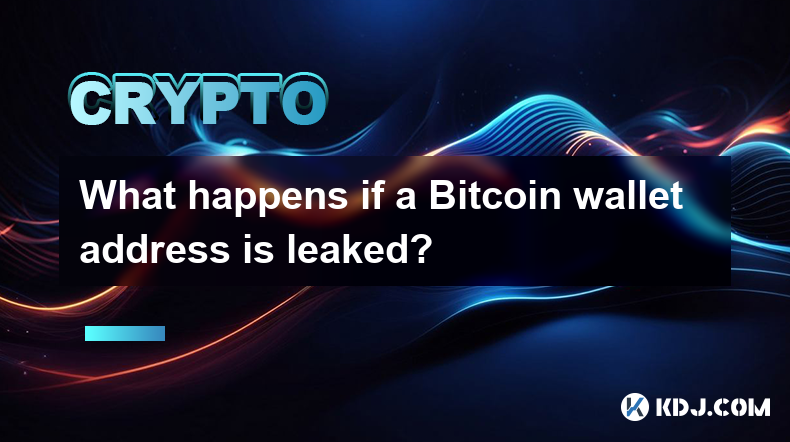
What happens if a Bitcoin wallet address is leaked?
Apr 16,2025 at 02:42pm
When a Bitcoin wallet address is leaked, the implications can be significant, depending on several factors. Understanding the potential risks and how to mitigate them is crucial for any Bitcoin user. This article delves into the various scenarios that can occur when a Bitcoin wallet address becomes public and offers guidance on how to protect your asset...

What are the latest ways to get Bitcoin for free?
Apr 16,2025 at 05:00pm
In the dynamic world of cryptocurrency, Bitcoin remains at the forefront, and many enthusiasts are constantly seeking ways to acquire it without spending money. While the allure of getting Bitcoin for free is strong, it's essential to approach these methods with caution and a clear understanding of the potential risks and rewards. This article will expl...
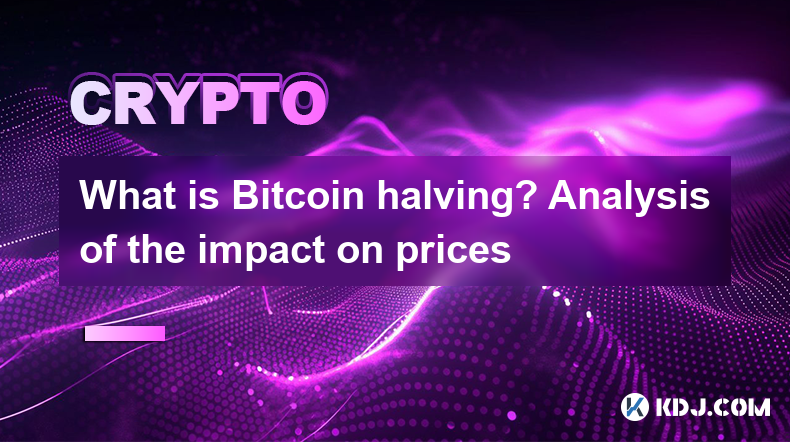
What is Bitcoin halving? Analysis of the impact on prices
Apr 09,2025 at 01:14pm
Bitcoin halving is a pivotal event in the cryptocurrency world that occurs approximately every four years, or every 210,000 blocks. The event is designed to reduce the rate at which new bitcoins are generated, thereby controlling inflation and increasing scarcity over time. During a halving, the reward that miners receive for successfully adding a block...
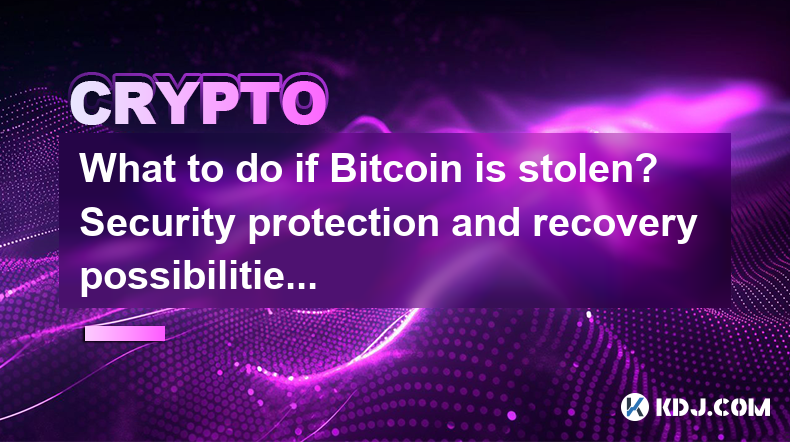
What to do if Bitcoin is stolen? Security protection and recovery possibilities
Apr 09,2025 at 03:42pm
If your Bitcoin is stolen, it can be a distressing experience, but there are steps you can take to protect your remaining assets and attempt to recover your lost funds. This article will guide you through the process of securing your Bitcoin and exploring recovery possibilities. Immediate Actions After Bitcoin TheftThe moment you realize your Bitcoin ha...
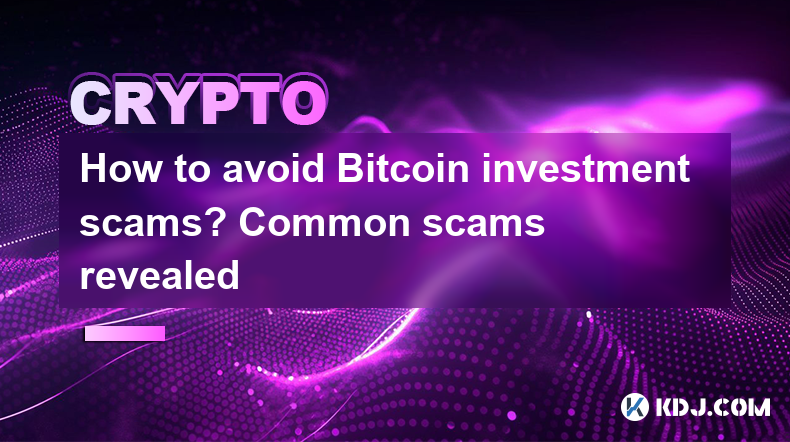
How to avoid Bitcoin investment scams? Common scams revealed
Apr 10,2025 at 05:14pm
Introduction to Bitcoin Investment ScamsBitcoin and other cryptocurrencies have become increasingly popular investment options, attracting both seasoned investors and newcomers alike. However, with the rise in popularity, there has also been a surge in Bitcoin investment scams. These scams can range from Ponzi schemes to fake exchanges and fraudulent in...
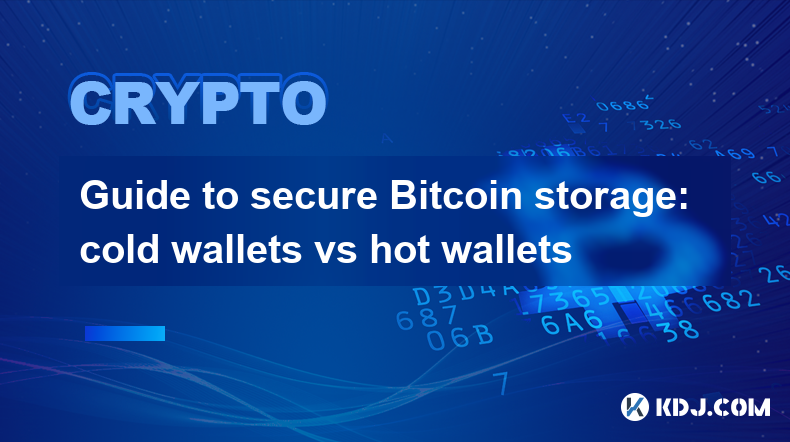
Guide to secure Bitcoin storage: cold wallets vs hot wallets
Apr 11,2025 at 08:42am
Guide to Secure Bitcoin Storage: Cold Wallets vs Hot Wallets When it comes to storing Bitcoin, security is paramount. The choice between cold wallets and hot wallets can significantly impact the safety of your digital assets. This guide delves into the differences between these two types of wallets, their respective advantages and disadvantages, and how...

What happens if a Bitcoin wallet address is leaked?
Apr 16,2025 at 02:42pm
When a Bitcoin wallet address is leaked, the implications can be significant, depending on several factors. Understanding the potential risks and how to mitigate them is crucial for any Bitcoin user. This article delves into the various scenarios that can occur when a Bitcoin wallet address becomes public and offers guidance on how to protect your asset...

What are the latest ways to get Bitcoin for free?
Apr 16,2025 at 05:00pm
In the dynamic world of cryptocurrency, Bitcoin remains at the forefront, and many enthusiasts are constantly seeking ways to acquire it without spending money. While the allure of getting Bitcoin for free is strong, it's essential to approach these methods with caution and a clear understanding of the potential risks and rewards. This article will expl...

What is Bitcoin halving? Analysis of the impact on prices
Apr 09,2025 at 01:14pm
Bitcoin halving is a pivotal event in the cryptocurrency world that occurs approximately every four years, or every 210,000 blocks. The event is designed to reduce the rate at which new bitcoins are generated, thereby controlling inflation and increasing scarcity over time. During a halving, the reward that miners receive for successfully adding a block...

What to do if Bitcoin is stolen? Security protection and recovery possibilities
Apr 09,2025 at 03:42pm
If your Bitcoin is stolen, it can be a distressing experience, but there are steps you can take to protect your remaining assets and attempt to recover your lost funds. This article will guide you through the process of securing your Bitcoin and exploring recovery possibilities. Immediate Actions After Bitcoin TheftThe moment you realize your Bitcoin ha...

How to avoid Bitcoin investment scams? Common scams revealed
Apr 10,2025 at 05:14pm
Introduction to Bitcoin Investment ScamsBitcoin and other cryptocurrencies have become increasingly popular investment options, attracting both seasoned investors and newcomers alike. However, with the rise in popularity, there has also been a surge in Bitcoin investment scams. These scams can range from Ponzi schemes to fake exchanges and fraudulent in...

Guide to secure Bitcoin storage: cold wallets vs hot wallets
Apr 11,2025 at 08:42am
Guide to Secure Bitcoin Storage: Cold Wallets vs Hot Wallets When it comes to storing Bitcoin, security is paramount. The choice between cold wallets and hot wallets can significantly impact the safety of your digital assets. This guide delves into the differences between these two types of wallets, their respective advantages and disadvantages, and how...
See all articles























































































